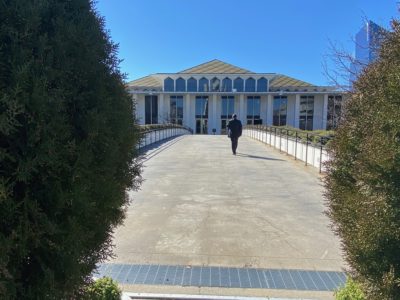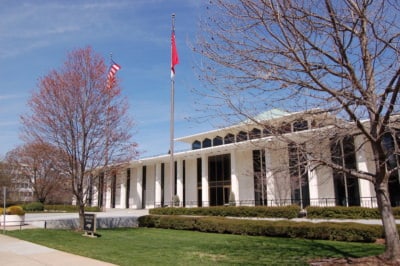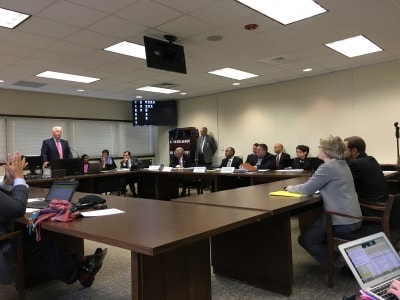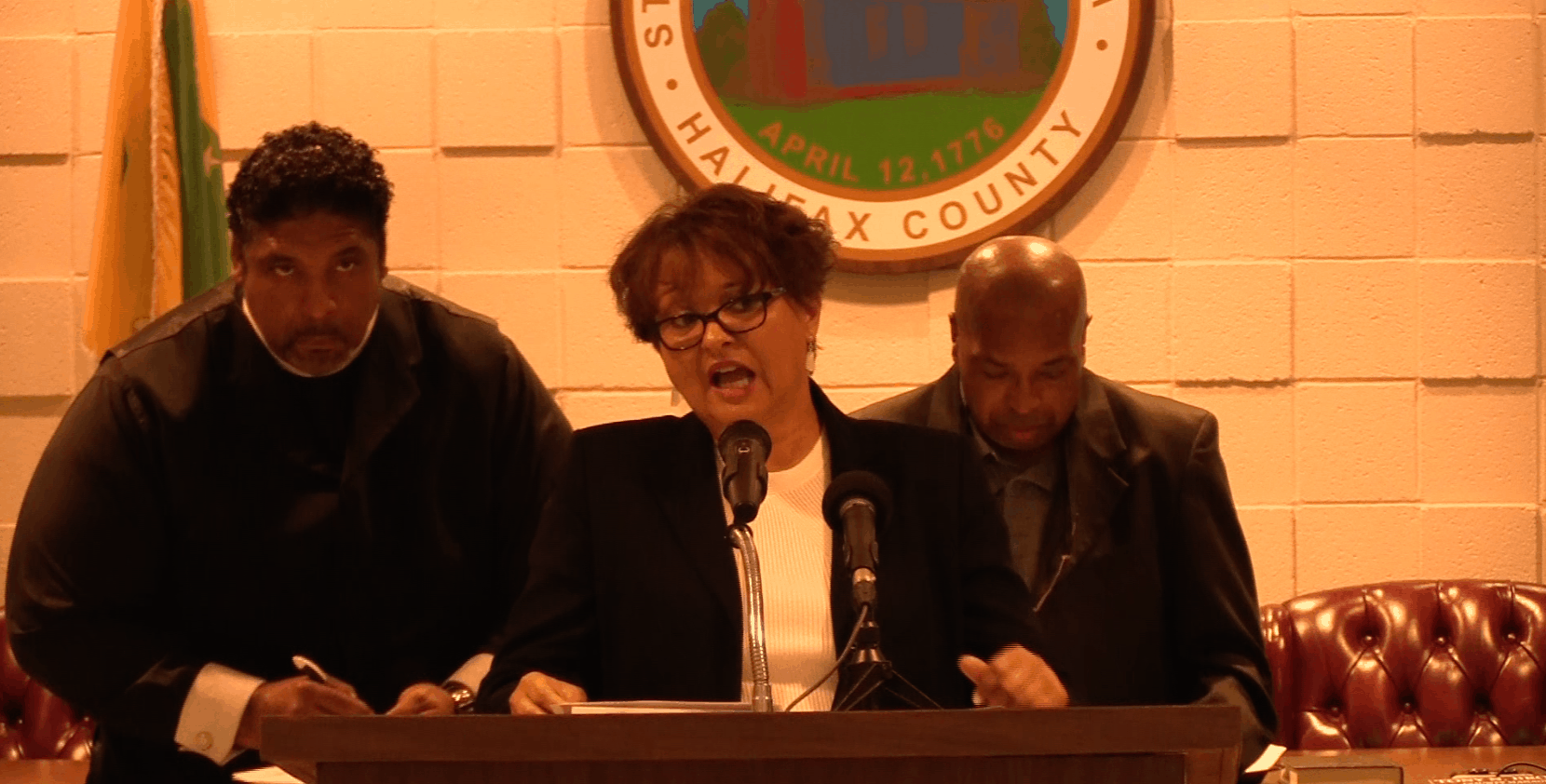The battle to merge the three school districts in Halifax County is one with deep roots.
As recently as 2013, the Halifax Board of County Commissioners nearly voted to go through with consolidation of Weldon City Schools, Halifax County Schools, and Roanoke Rapids Graded School District, according to the Roanoke Rapids Daily Herald. The Board tied 3-3, which meant the merger did not go through.
All three of the commissioners who voted against it are still on the board: Rives Manning, current vice chairman, Rachel Hux, and Vernon Bryant, current chairman. Two of the three who voted for it — Marcelle Smith and Carolyn Johnson — are still on the board.
At the time, Halifax County NAACP President David Harvey said both Bryant and Manning were unlikely to be reelected in 2014 as a result of the vote — a prediction which didn’t come true.
The merger vote was in June 2013. Later that year, in December 2013, a public forum was held to discuss the topic of merger.
According to WRAL.com, Manning said merger was a bad idea because Halifax schools needed better “leadership and money management.”
A recent letter sent by the State’s Department of Public Instruction to the Halifax finance officer shows that money issues may still be a concern in the district.
The letter, sent in early August of this year, states that Halifax used state funds incorrectly when paying the salary and benefits of some school employees.
The state asked Halifax to repay $109,394.75 by August 21. Halifax staff said that money has been sent to the state.
Halifax Board Chair Debbie Hardy said she doesn’t want to dwell on mistakes of the past.
“What happened in the past is the past,” she said. “We have a new start.”
Local families and organizations are revisiting the topic of merger. As reported here, the Coalition for Education and Economic Security (CEES), the Halifax County branch of the NAACP, and three parents and guardians of children in Halifax County public schools are suing to force the Halifax County Board of Commissioners to merge the three school districts.
The Board of Commissioners has hired an attorney — G. Neil Yarborough with the law firm Yarborough, Winters & Neville in Fayetteville — to represent them in the lawsuit.
Studying the merger
As we also reported previously, a 2011 study by the UNC Center for Civil Rights recommended that Halifax merge its three school districts. But an independent study commissioned by the Board of Commissioners did not necessarily recommend such a move, though it did suggest many areas where cooperation and consolidation of services could benefit all three districts.
The 2012 study by Evergreen Solutions was called “Operational Improvements in Halifax County School Districts.” It covered many areas of operation in the districts, but also examined the feasibility of merger. According to the Roanoke Rapids Daily Herald, Company President Dr. Linda Recio said at a meeting of the Board of Commissioners that better communication was needed between districts and that they should share services. Evergreen’s report noted significant financial consequences to a merger.
“In the long term, some savings are possible, not savings to the county or taxpayers, but in education improvements,” she was quoted as saying by the Roanoke Rapids Daily Herald.
Recio said the merger would result in less state funding for the districts, as well as higher taxes.
In the position paper against the merger released by Weldon City Schools and Roanoke Rapids Graded School District in 2011, the authors listed three ways districts can be merged in a county.
By agreement of the boards of education
A board of education can dissolve itself, leaving it to the state to adopt a merger plan
And on the recommendation of the Board of County Commissioners and the approval of the State Board of Education
The third option is the only one that involves involuntarily merging districts, according to the paper.
A possible fourth option could soon exist if a provision in the Senate’s proposed budget makes its way into a final budget bill. It would give the State Board of Education the power to merge districts:
“Provide the State Board of Education with authority to consolidate local school administrative units in contiguous counties as necessary to ensure that all school systems have the size, expertise, and other resources necessary to provide their students with the opportunity to receive a sound basic education.”
But as things stand, the lawsuit filed in Halifax County would rely on forcing the county’s Board of Commissioners to merge the districts.
The Weldon/Roanoke Rapids position paper states that when commissioners merge districts, the law requires “‘that the county adopting the plan provide local funding per average daily membership to the resulting local school administrative unit for subsequent years of at least the highest level of any local school administrative unit in the county during the preceding five fiscal years before the merger.'”
The Evergreen Solutions report said this would mean dramatic tax increases.
“Two separate sources provided to Evergreen calculated estimates that the annual cost to Halifax County taxpayers for a merger of all three LEAs into a single LEA would be from $7 to $7.5 million,” the report states.
The lawsuit filed to force merger argues that the Board of County Commissioners is funding an inefficient and racially stratified system of three separate districts.
It says that the Board of Commissioners’ decision to continue this system results in a lack of opportunity for a sound, basic education for all students in the district.
“…it has chosen to maintain and fund an inefficient three-district system that divides its children along racial lines into ‘good’ and ‘bad’ school districts,” the lawsuit states.
Halifax Public Schools are overwhelmingly African-American, with 2,533 African-American students out of an entire student population of 2,988, according to statistics from the Department of Public Instruction.
Weldon City Schools are also majority African-American, with 879 African-American students out of the entire 940 student population.
Roanoke Rapids alone is majority white, with 1,897 white students out of the total population of 2,939 students.
“The Board’s deliberate preservation of this tripartite system both produces and reinforces educational deficiencies in facilities, access to high quality teachers and administrators, educational and learning materials, student achievement and curricular and extra-curricular opportunities,” the lawsuit states.
The lawsuit also says that the tax distribution model used by Halifax County does not provide sufficiently for all three districts. And it notes that Roanoke Rapids Graded School District has received advantages not seen in Halifax or Weldon, such as updating of facilities and better access to instructional materials.
The lawsuit also singles out points made by Evergreen Solutions that seem to support the concept of merger.
“Consulting firm Evergreen Solutions presented its proposal to the Board in late 2011. The proposal stated that: ‘From the perspective of mitigating the effects of declining enrollment, consolidation is a no-brainer’ (emphasis added).”
The lawsuit says that after the presentation, the Board of Commissioners voted to move the study away from “potential benefits offered by consolidation.”
The lawsuit also says the Evergreen report identified savings associated with consolidating school functions, pointed out inefficiencies in the three-district education model, and recommended redrawing attendance lines so students could go to the “‘nearest elementary school with excess capacity.’”
The lawsuit goes on to say that none of this has been addressed by the county.
The Evergreen report itself points out trends of improving academic performance scores in both Weldon and Halifax, and states that if trends continue, objections to merger related to the quality of education should “cease to exist in the coming years.”
Cooperation and turmoil in Halifax
Meanwhile, in Halifax County, as we reported previously, the state is taking a more active role in budget and hiring matters.
The state sent a letter to Halifax last month stating its intent to intervene further in the district.
This is a continuation of interventions from the state since a 2009 court consent order in the case Hoke County Board of Education et al. v. State of North Carolina and the State Board of Education, otherwise known as Leandro.
Earlier this month, the Halifax Board sent a letter back in response.
The letter states:
“In partnership with NCDPI personnel, district office staff and board members have tried to make every effort to comply with the court order.”
The letter goes on to state the board’s continued plan to cooperate with the state.
“The HCSB will work together with all state leaders whose goals, like those of the HCSB are to ensure that every child has access to a high quality education.”
The letter finishes with:
“We know that when we continue to work together in compliance with state leadership, the children who are the future of Halifax County will be the beneficiaries.”
That letter was dated August 17th.
On August 26th, Halifax Board of Education member Charles Hedgepeth sent a letter of his own to State Board chair Bill Cobey.
His letter references an October 7, 2013 letter from the State Board and Chairman Bill Cobey that said that the State Board is “aware some members of the HCS board have been disruptive, uncooperative and obstructionist in their interactions with SBE designees and certain HCS staff.”
The State Board letter goes on to list some of the offenses, including:
(1) driving away effective administrators and teachers,
(2) attempting to suspend the HCS Superintendent’s power to transfer within the district independent of board approval, and
(3) requesting monthly the resignation of the Board Chair and Superintendent.
We noted previously at least one example of disruptive behavior by former Halifax Board of Education Chair Carolyn Hawkins, during a possibly illegal closed session meeting — though that incident occurred years after the State Board’s 2013 letter.
Hedgepeth himself has been vocal in his criticism of Superintendent Elease Frederick in letters to the editor to the Roanoke Rapids Daily Herald. He has also publicly called for her resignation and went so far as to say that her contract is invalid.
In a letter that ran in May of this year, Hedgepeth said the following about the contract:
“During the July 2012 board of education meeting, Donna Hunter, former Board Chair, commented that Dr. Frederick’s contract had been extended through June 30, 2016. I objected because the matter was never discussed in closed or open session and officially voted on by the Halifax County Board of Education to extend Dr. Frederick’s contract through June 30, 2016.”
The consent agenda for that meeting only has the following vague language on matters of personnel:
“Recommendations for Administrative, Certified, Non-Certified, Transfers, Reassignments and Resignations, as discussed in closed session.”
However, in closed session minutes for that meeting obtained from the Halifax School District, more detail is provided on the personnel discussed.
“Dr. D Hunter shared with the board a copy of the superintendent’s new contract. We are looking at the data. Student achievement is moving in the right direction. We will be asking to renew the contract for two (2) years (2014-2016),” the closed session minutes state.
The closed session minutes also have a copy of the contract signed by both the superintendent and then-board chair Donna Hunter.
According to the open session minutes of that meeting, the consent agenda was approved by all board members except Hedgepeth.
In Hedgepeth’s recent letter to the state, he says that he wrote a letter in 2013 responding to the state’s allegations and asking to know specifically which members were responsible for the acts described in the state’s letter. Hedgepeth also states in the letter that he never received a response.
Hedgepeth’s most recent letter goes on to say that the state is complicit in the problems facing Halifax.
It ends by referencing Leandro Judge Howard Manning’s statement that an “academic genocide” is taking place in Halifax.
“Now, with having served on the Board of Education for three years, I am persuaded that the ROOT of this ‘academic genocide’ is potential fraud, waste, abuse, misuse, and mismanagement of public funds.
“Again, I ran for office in 2012 to help remedy this ‘academic genocide.’
“Hopefully, you will begin treating us with respect and recognition as equals.”
Cobey said he would have to poll the State Board of Education to get the answers Hedgepeth is looking for, that he believes the majority in Halifax want to do right by county children, and that he is unlikely to respond to Hedgepeth’s letter.
Hedgepeth isn’t the only one at odds with the state. During the press conference on the lawsuit brought by the Halifax NAACP, CEES, and three parents and guardians of Halifax Public Schools children, Rebecca Copeland of CEES criticized the state’s efforts in Halifax.
“The truth is the turnaround plan by DPI was an attempt to cover the bodies,” she said, adding later: “When DPI could not move the needle with regard to educational improvement, it turned its tact to the local school board.”
Copeland said she is the sister of Halifax County Board of Education member Susie Lynch-Evans. She said that her family relationship has nothing to do with her interest in the merger.
“My interest in the merger is about making better opportunities in Halifax County,” she said. “We just don’t have time for any agenda other than that.”
Education spending and improvement
The situation in Halifax is complicated by the fact that Halifax Schools actually have some of the highest per-pupil spending in the state.
In a John Locke Foundation article written by Terry Stoops, he noted the high expenditure.
“Last year, Halifax County spent $11,021 per student, which is reasonably close to the national average expenditure estimated by the National Education Association (NEA) for the 2013-14 school year, $11,355 per student in fall enrollment, and far above North Carolina’s $8,477 per student average,” he wrote.
He goes on to criticize the argument that Halifax Public Schools’ problem is its poverty.
Weldon City Schools in Halifax County has the 4th highest per-pupil expenditure in the state at $12,155.77.
Roanoke Rapids clocks in at 73 with $8,613.47 per pupil.
To get an idea as to why a school system like Halifax Public Schools, with so much per-pupil spending, would still be lagging in student achievement, I talked to the former Director of District and School Transformation at DPI, Pat Ashley.
First of all, she said the reason Halifax has such a high expenditure is because the federal government contributes funds to help the district’s large population of economically disadvantaged students catch up to their peers.
In 2013-14, Halifax Schools were overwhelmingly made up of students who qualify for free-and-reduced-price lunch programs, as we’ve reported previously.
These students have disadvantages stemming from lack of school readiness followed by fewer opportunities for extra out of school learning experiences as well as years of attending underperforming schools, she said.
“You are playing catch-up,” Ashley said. “If students come to school not ready to learn, then you’re going to have to help those students overcome those deficiencies.”
But she also says that if a district is receiving adequate basic funding and is still underperforming, then the next area to examine is district finances.
“If a school district has adequate basic funding, then the real question is how are the dollars they have being spent?” she asked. “Are they targeted to those activities that are efficiently promoting student learning?”
Regardless, Ashley said Halifax is making progress even though it is still a low performer. She said that turnaround efforts take years to show progress.
“If you read the research nationally on school turnaround, an individual school takes three to five years to turn around. To turn around an entire district… the research suggests its a five to 10 year process.”
The state has been intervening in Halifax by consent order since 2009. And Halifax has been improving. Ashley notes that many schools in the district meet and even exceed growth, positive benchmarks for students struggling to catch up. In both the most recent round of school performance grades and last year’s, four of the districts’ 11 schools exceeded growth and five met growth.
However, the school performance grades are created using a formula of 80 percent academic achievement and 20 percent academic growth, so schools in Halifax did not fare so well when it came to grades. Three received a C, five received a D, and three received an F in the most recent school performance grades release.
In contrast, all four Roanoke Rapids schools received a C. The four schools in Weldon received a B, a D, and two Fs.
Regardless of the grades, good news came from the state this year on Halifax: It is no longer last in the state for achievement. Tyrana Battle, Assistant Superintendent for Halifax Schools, said that using the information from the state’s accountability website, she discovered that Halifax had moved up to 113 from 115.1 While that may seem a small step, Ashley said the degree to which the district was behind shows that the schools have come a long way.
“You also have to remember that Halifax started extraordinarily low,” she said. “The district was so far below the next district (114) when the turnaround process started. To have closed that wide gap and now moved ahead of other districts is a major accomplishment.”
Recommended reading




